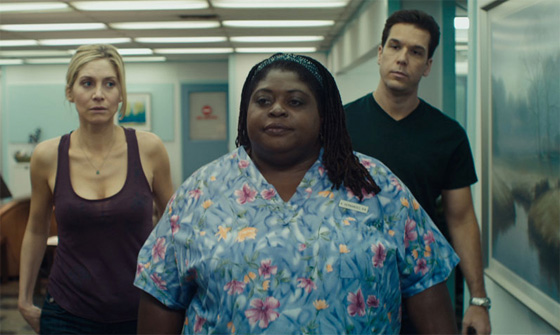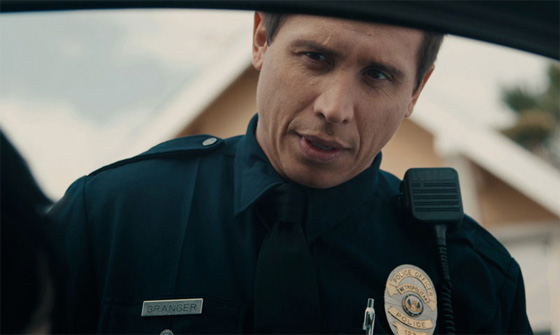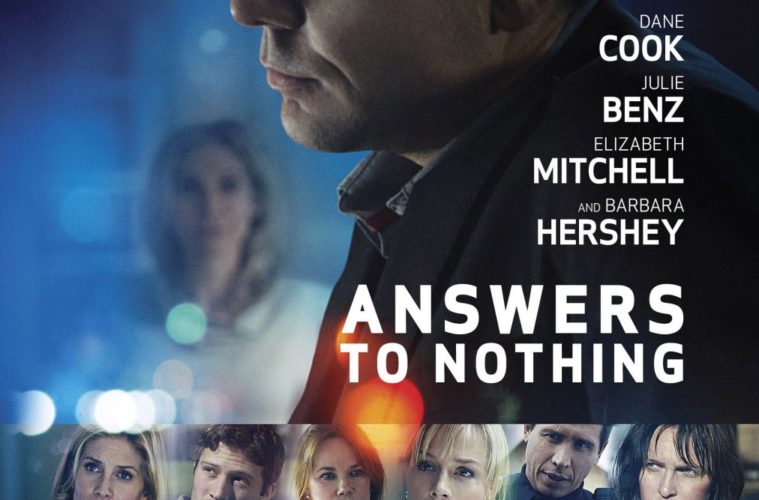
So much happens in Matthew Leutwyler’s Answers to Nothing, but how much is actually relevant? An adulterous husband with a rockstar mistress and lawyer wife, a police detective best friend and her key suspect in a child kidnapping case, a recently graduated police officer and his grade school teacher neighbor, a racist black television writer and the soundboard mixer she meets while walking their dogs, and a recovering alcoholic caring for her brain dead brother all cross paths in Los Angeles. Southern California hides their secrets and opens them up to the tragedy of life and the mistakes made every second of every day. They try so hard to ignore the people around them, but what’s the point of living in a community if society refuses to watch out for each other?
This appears to be the main question Leutwyler and co-writer Gillian Vigman asks. Through the transgressions of regular people we are made aware of the reality we all fall prey to our daily choices. Lust, guilt, regret, fear, love—these and more serve as motivators to either succeed in overcoming hardships or excuses to escape into a fantasy that will only create more pain and suffering in the long run. Like Crash, The Air I Breathe, and Thirteen Conversations About One Thing before it, Answers to Nothing tries hard to portray a slice of reality by the coincidental comings and goings of strangers. An unfortunate title that should prove wonderful fodder for witty reviewers to use detrimentally, the answer at its end is merely the discovery that there are none. Nothing has been answered because nothing ever will.
We’ll always hurt those we love, always refuse to forgive while selfishly expecting to be forgiven. It’s human nature—we’re apologetic, entitled, and so wrought with the pain of our past that it’s impossible to break the mold and live unencumbered by the errors we inevitably make. Second chances are hard to come by anywhere let alone in a city of excess like LA; all must tread softly and surely so as not to destroy what they’ve built. And even though things like an affair, bigotry, and familial negligence are horrific in their own ways, what do we do when a child goes missing below our noses? What do we do when after six days it appears no one will find out the truth? Do we put aside our fears and crippling insecurities to actually go out and make a difference or do we hide behind our shielded walls to wait for someone else to be a hero?
It is this kidnapping case that stands out from the more over-wrought drama concerning people we care little about. Detective Frankie (Julie Benz) has purpose in her interrogations because she has a vulnerable young girl of her own at home. Desperate to solve the crime and reunite a daughter with her family, she’ll go as far as implicating the father once her prime suspect Beckworth (Greg Germann) becomes a charmingly smarmy dead end. Add in her kid’s teacher, Carter (Mark Kelly), and his creepily evident interest in the case and we wonder if perhaps her daughter will be next. An adult who leaves school to play an online role playing game with people he’s never met, his yearning to save the princess through fantasy begins to seep into real life. Anxious and emotionally confused, this desire to be the hero doesn’t necessarily mean he isn’t the one he needs to save her from.

Central to all that occurs, this looming mystery finds a way to metaphorically allude to the rest as Carter wrestles with his lack of courage to make a stand. We’re all running away from things, big or small. Benz runs from the pain of a divorce, Kate (Elizabeth Mitchell) flees her apparent inability to conceive children, and her husband Ryan (Dane Cook) can’t stop from becoming the father who left nine years ago for a mistress he still never told his wife (Barbara Hershey) about. Allegra (Kali Hawk) desperately wants to get away from herself for being the type of black person she hates—those who look down on others suppressing their color with money and success—rather than accepting herself as a human being above skin; Tara (Aja Volkman) runs from stability by living fast and sleeping with men she can’t have; and Drew (Miranda Bailey) wants nothing more than to make it up to the brother (Vincent Ventresca) she paralyzed, body and soul.
But while each of these characters have a story to tell—a struggle to prevail against—I can’t deny the fact that I only ever wanted to get back to the kidnapping. Besides Drew’s tale for salvation captivating through Bailey’s standout performance, it was Kelly’s Carter who held my attention with his complete ambiguity. I couldn’t wrap my head around whether he was simply a loner who reveled in educating the community’s children or a creep with the means to satisfy his sick pleasure for power and control. I still wasn’t sure where his story would lead even when he knocks on Jerry’s (Erik Palladino) policeman’s door, but I never grew tired of finding out. Besides the oft chance someone else had a singular scene of poignancy, there wasn’t really anything else to grab onto.
With a beginning tale of romance mirroring Marty McFly’s convalescence by the hands of his mother in Back to the Future and the end of Drew’s tale recalling Run, Fatboy, Run, very little stood out as original since clichés and contrivances are unavoidable in sprawling interwoven narrative films like this. Some characters like Volkman get lost in the more woefully unnecessary subplots of Cook and Mitchell while others like Zach Gilford and Hawk’s relationship aren’t given ample time to excel. Bailey, Kelly, and Palladino—who creates the most stunning surprise of all—will keep you invested throughout their tales despite our waning interest in the rest. But with some aesthetically pleasing cinematography and perfectly used music from Volkman’s band Nico Vega, there is more to like than not—it isn’t all vapid nothingness to dismiss. An overly ambitious work of mediocrity, a few performances shine bright enough to make it worth a rental.
Answers to Nothing is in limited theaters.

